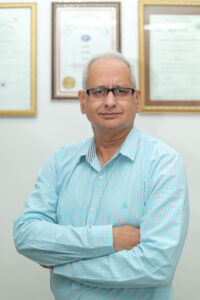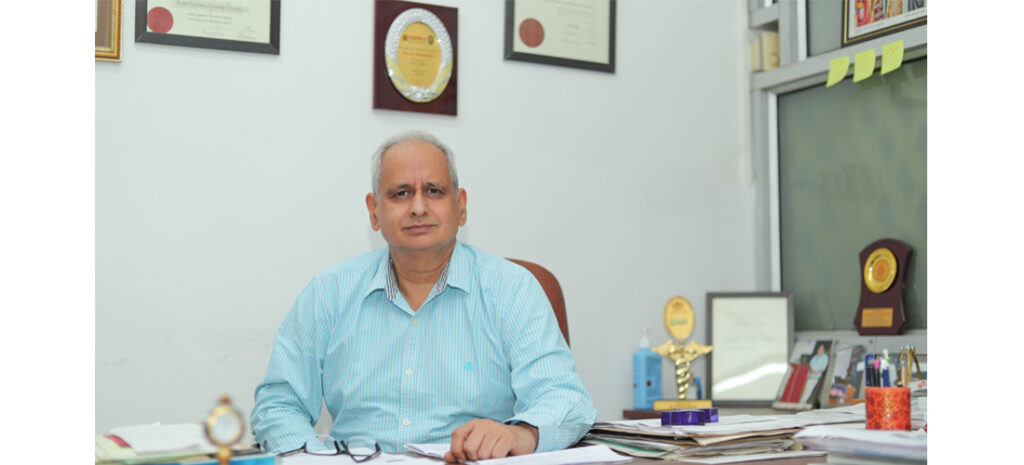A Professor of Internal Medicine at PGIMER Chandigarh and a propagator of healthy living, he has been heading the COVID-19 division at his institute all through the trying times. Meet Prof Ashish Bhalla, whose subtle personality and intellectual, intelligent words, can be a source of tremendous knowledge about general one’s general well-being! Here is a conversation between him and The Lifestyle Journalist Editor-in-Chief Dr Neha Miglani.
What is your general idea of well-being?
One needs to have considerable knowledge about his or her fitness. There are no shortcuts to good health. People go on different kinds of diets or drugs, which have now become a fad. But it’s imperative to maintain a balance of input and output of the body.

People blindly follow dieticians for instant results. But they do not realize that they are causing more damage. So watch what you eat! Take out refined sugar, refined flour, excessive fat and trans-fat from your diet. It will be a good chance for the system.
We conducted a study on PGIMER Chandigarh doctors and we found that their consumption of fruits and vegetables was very less. 1 to 2 servings of fruits and vegetables is a must. We need to change the carb-rich diet that we are so used to. The conventional diet has to change. Earlier people used to work on farms and fields and their physical activity was much more due to which even a carbohydrate-rich diet would work for them. But now diet has remained the same but work routine has changed. Wheat and rice are cheap and sustainable. But fruits and vegetables are perishable items. Hence, it was convenience and not nutrition which took over. Also, fruits and vegetables that are not in season must not be consumed. These are not nutritious and not fresh. Therefore, stick to seasonal fruits and vegetables. Stick to a millet based diet. These are all fibre rich foods! Earlier, gluten allergy was not heard of, especially in North India. As much as possible avoid canned foods and also aerated drinks. There is a tremendous amount of sugar in it.
Besides food, exercise is extremely important. Any amount of physical activity is better than no activity. We are living in an age of AC cars, AC offices. We are not exposed to Sun, thereby causing Vitamin D deficiency. Our bone health is related to the right exposure to Sun. The commonest excuse by people is that ‘I don’t get time for exercise’. There are small changes one needs to do in routine. For instance, walk down to the market instead of driving if it is close by. 30-45 mins of any physical activity are good. It can be walk or yoga at home or weight training or simply brisk walking. Balance out the activity. So if one walks, one must also do some exercise for the upper body. Planks are highly recommended. They strengthen the arms and are good for the whole body. These are all simple and inexpensive ways to take care of your health.
How to improve public health services?
Let’s go a step further and inculcate healthy habits in our children. Educate them! Implementation of “Swachh Bharat” in schools and colleges needs to be more rigorous. If children learn, automatically there will be a major shift. Thereafter if parents throw something on the road or on the streets, children will point them. We have this tradition of feeding people through Langar (Punjabi term). We must have Langar for cleanliness (a drive) in which people come together and clean their surroundings. Every school or any educational institution, for instance, should be responsible for cleaning 1Km area of its surrounding. There has to be a big national drive. Youth needs to be more sensitive about keeping their surroundings clean. This is a nation-building activity and must be encouraged. Banning plastic is imperative. Bio-degradable and environment-friendly packaging need to replace the current plastic over-use.
What is your advice to young students particularly medical students who strive to be good doctors?
Hard and sincerity have no replacement. There are no shortcuts in life. Children are kept away from the realities of the real world. They don’t know the challenges of life in AC classrooms and AC homes. There is lesser tolerance and acceptance among youth now for this reason. We have always pampered children whereas they need to hear these lines also- ‘You are not the best. Become your better version. Learn more!’ dependence on drugs and issues like depression among youth is for this reason- all these things happen when a child has never been put in challenging circumstances. To hide all this, one buys expensive cars, expensive things. This is only to cover up the lack! There has to be a shift in the younger generation. As medical students, we were told that you are not good enough. In Wardha, where I received my education, it was mandatory to spend a month in a village and it taught us many life lessons the hard way. New age medical students have not seen that. Still, they can learn with sincere efforts!
What are your top life lessons?
Firstly, self-belief and confidence (which comes from knowledge). Secondly, sincerity has no replacement. Thirdly, hard work has no substitute. I learnt an important lesson from a teacher in my medical college. When he wasn’t sure, he used to say- “I don’t know. I am trying to find out.” So you may not know everything, but a sincere response and telling your patient that you are finding out and fixing will make them understand the situation too. I have learnt that real art is to find out the problem in a scientific manner. Also, there are no shortcuts in life.
You have been heading the COVID-19 division at PGIMER, what has COVID-19 taught you personally?
COVID-19 pandemic and lockdown have taught me that one can survive with the bare minimum. Our needs are very few and wants are more! Realizing this makes one stronger and more stable.

